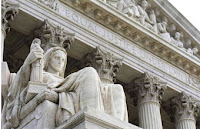For example, the special tax rule that allows a married couple to exclude up to $500,000 of gain from sale of a principal residence is worded as follows (highlight added):
Section 121(b)(2) - "Special rules for joint returns. In the case of a husband and wife who make a joint return for the taxable year of the sale or exchange of the property—
(A) $500,000 limitation for certain joint returns. Paragraph (1) shall be applied by substituting
“$500,000” for “$250,000” if—
(i) either spouse meets the ownership requirements of subsection (a) with respect to such property;
(iii) neither
spouse is ineligible for the benefits of subsection
(a) with respect to such property by reason of paragraph
(3)."
If the Supreme Court finds that the Defense of Marriage Act (DOMA; P.L. 104-199) is unconstitutional, it should then mean that the federal government will treat couples married per state law as married. It doesn't mean it will find them to be "husband and wife." So, it appears that there would still need to be some fixes to the tax law to truly allow all married couples to be treated similarly under the federal tax law (and perhaps other federal laws also have language in need of change).
Congress could just add a statement to the law that any reference to husband and wife means any couple married under state law. Or perhaps the IRS can make that interpretation.
And it goes beyond "husband and wife." The term "his spouse" is used 63 times in the Internal Revenue Code! Just shows that the language is a bit dated - assumes taxpayers are male!
There would also be the issue of whether the IRS would expect same-sex couples to amend returns to file jointly. I don't think they will. But, if a couple would have a tax savings, they should be able to. As the Reuters article points out though, many same sex couples, particularly if both have similar income and they are beyond the 15% tax bracket, will have a marriage penalty! That is, when they file jointly, their taxes will be higher than when they file two returns as single (or perhaps one uses head-of-household status). The marriage penalty is something that we likely won't see disappear from the law anytime soon (the fix Congress put in place temporarily in 2001 and made permanent in 2012 only helps if you are in the 15% bracket).
There will by several tax considerations if the Supreme Court overturns DOMA (which it should do). Some of these relevant tax rules for same sex married couples include taxation of fringe benefits, estate planning, retirement plans, and how dependents are claimed.
I believe a decision is expected in June.












2 comments:
The tax issues surrounding the DOMA overturn present a great opportunity to analyze the matter against some of the AICPA’s principles of good tax policy. If DOMA was deemed unconstitutional and gay marriages are recognized by the federal government to be able to file as married on their tax returns and receive the same rights and benefits as heterosexual couples, the decision would meet the equitable and fairness principle. Gay couples will be taxed the same as heterosexual couples. Although it is expected that gay couples will pay more in taxes as the marriage penalty will now apply, they will be treated the same as non-gay couples and fulfill the principle that similar situated taxpayers should be taxed similarly.
Our tax system should not enact tax laws that hinder gay couples from receiving the same tax treatment as heterosexual couples due to their sexual orientation. Without the recognition of their union for tax purposes, gay couples are forced to pay for taxes on healthcare benefits and additional tax planning in order to avoid paying higher estate taxes. The current law creates complication and sways tax decisions regarding these issues which do not meet the simplicity and neutrality principles of good tax policy. Inconsistent terms for how a married couple should be defined also create complication.
Based on Kim Dixon and Patrick Temple-West’s article Analysis: Gay Marriage Rights May Carry Bigger U.S. Tax Burden For Some, allowing gay couples to be taxed the same as heterosexual couples would generate more in tax revenue due to the marriage penalty. Getting rid of the different tax treatment will allow for resources to be allocated to more efficient endeavors and help stimulate the economy. The Government will also be able to collect and estimate additional tax revenue from recognizing gay marriages. It could very well be a win-win situation for all.
Another resource on how DOMA will impact the definition of a married couple and the complication and unfairness surrounding taxable health benefits for same-sex couples previously mentioned is an article from Jada Gaves which can be found through the following link http://money.usnews.com/money/careers/articles/2013/04/11/the-fate-of-doma-and-whats-at-stake-with-employee-benefits.
Post a Comment